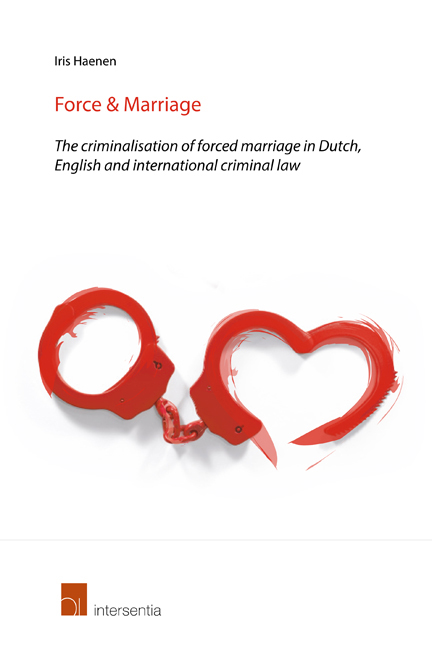 Force & Marriage
Force & Marriage Book contents
- Frontmatter
- Acknowledgements
- Contents
- Abbreviations
- General introduction
- PART I FORCE AND MARRIAGE: Description and definition of forced marriage
- PART II A TALE OF TWO THEORIES: Criminalisation on the level of national law and international law
- PART III THE LAW AND FORCED MARRIAGE: Legal frameworks concerning forced marriage in Dutch, English and international criminal law
- Chapter 7 Dutch and English law and forced marriage
- Chapter 8 International criminal law and forced marriage
- Chapter 9 Two-level legal comparison
- PART IV ANALYSIS AND CONCLUSIONS
- Summary
- Bibliography
- Table of cases
- Curriculum vitae
- Index
Chapter 8 - International criminal law and forced marriage
from PART III - THE LAW AND FORCED MARRIAGE: Legal frameworks concerning forced marriage in Dutch, English and international criminal law
Published online by Cambridge University Press: 22 November 2017
- Frontmatter
- Acknowledgements
- Contents
- Abbreviations
- General introduction
- PART I FORCE AND MARRIAGE: Description and definition of forced marriage
- PART II A TALE OF TWO THEORIES: Criminalisation on the level of national law and international law
- PART III THE LAW AND FORCED MARRIAGE: Legal frameworks concerning forced marriage in Dutch, English and international criminal law
- Chapter 7 Dutch and English law and forced marriage
- Chapter 8 International criminal law and forced marriage
- Chapter 9 Two-level legal comparison
- PART IV ANALYSIS AND CONCLUSIONS
- Summary
- Bibliography
- Table of cases
- Curriculum vitae
- Index
Summary
INTRODUCTION
None of the statutes of any of the international(ised) courts or tribunals specifically list the act of forced marriage as a crime against humanity, a war crime or an act of genocide. The offence was first explicated in the case law of the SCSL in 2004, when the Prosecutor of that court encountered the phenomenon of ‘bush wives’ during his investigations into the atrocities committed during the civil war in Sierra Leone. The Trial Chamber granted the Prosecutor leave to add a new count of ‘other inhumane acts’ (Article 2(i) SCSL Statute) pertaining to the offence of forced marriage to the indictments in two cases (against former AFRC and RUF leaders), but dismissed the Prosecutor's motion for leave to amend the indictment in the case against two former CDF leaders in a similar manner. As a result, the Trial Chamber could hear evidence supporting forced marriage as a (new) crime against humanity, which, for the first time in the history of international criminal law, opened the door for the prosecution of the crime of forced marriage as a crime against humanity. In subsequent SCSL judgements, the crime of forced marriage was defined, but this did not happen without problems or disagreements.
Paragraph 2 will discuss and evaluate in detail the proceedings before the SCSL Trial Chambers and Appeals Chamber in the AFRC, RUF and Taylor cases. The second part of this chapter focuses on the Extraordinary Chambers in the Courts of Cambodia (ECCC). Forced marriage is charged as an ‘other inhumane act’ in the case that is commonly referred to as Case 002. When the proceedings in this case commenced, in 2007, there was no indication that this case would take longer than the average international criminal case to complete. However, the proceedings continue to drag on and are marked by delay upon delay. At the time of writing (January 2014), there was not a single (trial) judgement in Case 002. As a result, there is no relevant case law to discuss and analyse. Only the pre-trial proceedings offer some insight into the offence of forced marriage within the legal framework of the ECCC. They are briefly addressed in paragraph 3.
- Type
- Chapter
- Information
- Force & MarriageThe criminalisation of forced marriage in Dutch, English and international criminal law, pp. 263 - 286Publisher: IntersentiaPrint publication year: 2014


